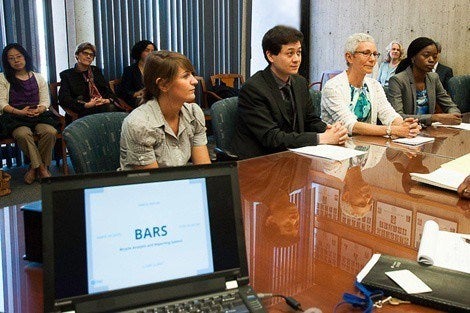May 3, 2013 — Despite its flummoxing street layout and notoriously aggressive drivers, Boston has made strides in recent years to redeem itself from a reputation as one of the worst cities for bicyclists in the country — if not the world. Since 2007, the city has debuted the Hubway bike share system, painted more than 50 miles of bike lanes, and expanded community education and helmet distribution efforts. But the scope of the work left to do was brought painfully into focus in 2012 following the deaths of five bicyclists, including Boston University graduate student Christopher Veigl, who was killed on the very day that the Boston City Council was holding a hearing on bicycle safety.
A team of four Harvard School of Public Health (HSPH) students met with Boston City Councilors Ayanna Pressley and Felix Arroyo and members of Mayor Thomas Menino’s staff on May 1, 2013 to present their proposal for making Boston’s streets more bike-friendly. The students were the winners of HSPH’s second annual Spring Challenge, a School-wide policy writing competition. They competed with seven other teams to develop a proposal on the issue in just eight days.
The winning proposal, from Temitope Olukowi, MPH ’13, Claire Albert, SM ’14, Marie-France McIntee, MPH ’13, and Aaron Pervin, SM ’14, calls for the development of a system to improve the way that bicycle safety data, such as ridership volume, crash reports, and injury severity is collected, shared, and used in the city. Dubbed the Bicycle Analysis Reporting System (BARS), their database would bring together information currently kept independently by Emergency Medical Services, the police, and other agencies in Boston. They also propose the deployment of mobile cameras at targeted crash hot spots to help determine ridership volume at those locations. (Data would be used strictly for research purposes and civil liberties would not be compromised, they said.) This aspect of the program is important, say the students, because it is not enough to know that six riders crashed at a particular intersection.
Eight student teams compete
The inaugural Challenge was launched by [[John McDonough]], professor of the practice of public health and director of the Center for Public Health Leadership, and Fawn Phelps, the Center’s assistant director, in 2012. The aim of the Challenge is to give students experience translating their public health training into real-world policies.
Following a kickoff reception on April 11, the 34 students participating in the Challenge got a weeklong crash course in policymaking and the politics of urban biking from a variety of guest speakers, including Nicole Freedman, director of Boston Bikes and a former Olympic bicyclist, who serves as a citywide advocate for urban biking. Freedman spoke about her goal to increase bike ridership to 10% of all transportation journeys in the city by 2020, and the challenges of promoting bike safety without scaring away potential riders who are “interested but concerned” about safety. The students had just eight days to work on their proposals, which they squeezed in around their normal course load.
On April 23 and 24, the eight teams faced off before panels of expert judges to win the opportunity to share their ideas with lawmakers at City Hall. Among the proposals were piloting bike safety interventions—including painting bike lanes green to improve visibility and installing traffic signals that give bikes a head start when the light turns green—at three dangerous intersections and promoting bike culture in Boston’s Roxbury neighborhood. In the end, the judges voted the BARS team the best in all criteria: proposal, presentation, policy memo, and use of evidence and data.
Policy needs data
Boston City Councilors Ayanna Pressley and Felix Arroyo welcomed the winning team to City Hall for their May 1 presentation, which also was attended by bicycling advocates and mayoral staff. Arroyo called this the “right moment to do much, much better” on improving the city’s biking environment.
A variety of remedies — such as protected bike lanes known as cycle tracks —have been proposed for improving safety throughout Boston, particularly in crash-prone intersections and heavily traveled main streets. Some have been implemented in recent years. But no comprehensive data exists to help city policy makers prioritize interventions or know whether or not those they try are effective.
Student team member Olukowi, a physician studying in the Global Health and Population Department, equated this to prescribing medication to a patient without taking his or her vital signs.
“Our idea stemmed from that gap,” said Pervin, a student in the Health Policy and Management Department who has previous experience with injury surveillance. “We quickly agreed to develop something that would give policy makers that information.”
Challenge faculty advisor David Hemenway, professor of health policy and director of the Harvard Injury Control Research Center, was pleased with the winning team’s work. “The first step in the public health approach is to get the data, so you know what to do, you can intervene, and then you can evaluate what you did. Without that, it’s very hard to succeed,” he said. Whether or not the students’ proposal is implemented as written is less important than the fact that they got the importance of a good data system planted “in the ears” of the councilors. Hemenway feels that the climate is right for the city to take additional action to improve bike safety. “It’s in the air now, it’s in the water that bicycling matters and we should do something,” he said.
“Spring Challenge is one of a series of new opportunities for HSPH students to hone and test their leadership skills in real time and experiential settings,” said McDonough. “And it’s not just about the participants. A student executive team of 18 organized and ran the entire program — and learned a few important lessons themselves about managing an intense and complex operation.”
Photo: Aubrey LaMedica
